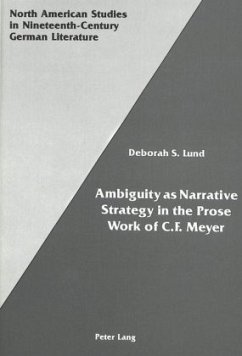This study of the prose work of Conrad Ferdinand Meyer (1825-1898) focuses on the central role played by ambiguity. This narrative element is traced in both the fragments, rarely discussed in critical literature, and in the novellas. While situating Meyer's work in the context of the nineteenth century, this examination of narrative strategy provides an avenue of approach fruitful for both the non-specialist and the Meyer-scholar, revealing the unusual breadth of Meyer's prose.
"Deborah Lund's book is an original contribution to the understanding of a great if elusive writer of the 19th century, Conrad Ferdinand Meyer. The innovation that characterizes her work is manifold. For one thing she brings order into the chaos that has ensued from the different ways in which ambiguity is described in the literature on C.F. Meyer. Secondly, she includes a thorough treatment of Meyer's 'Prose Fragments' in her discussion, which is rarely done. Thirdly she shows that ambiguity, a form of perspectivism, is not merely an outcrop of Meyer's indecisive psychological personality as which it is often portrayed, but a conscious strategy in his attempt to come to terms with the world and as such a trait which Meyer shares with his contemporary culture. In exploring this communality Lund of course immediately encounters Nietzsche as a figure with parallel preoccupations. But she distinguishes between Nietzsche's perspectivism and Meyer's, and that is the fourth innovative aspect of her book, by showing that the former's is much more optimistic than the latter's, who suffers from the split world view that is imposed upon him by the tenor of his time." (Egon Schwarz, Washington University)
